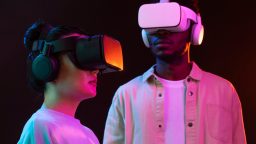Artificial Intelligence (AI) is rapidly transforming the world of work. From automating routine tasks to enabling new innovations, AI is changing the landscape of employment. As we move into the future, AI will undoubtedly replace certain jobs, but it will also create new opportunities that were previously unimaginable. So, what does this mean for the job market? Let’s explore the roles AI is likely to replace and the new careers it might help create.
Jobs AI Will Replace
- Manufacturing and Assembly Line Jobs
One of the most prominent sectors affected by AI is manufacturing. Robots and AI-powered machines have already started replacing human workers in tasks like assembly line operations. These systems can work tirelessly without the need for breaks, offering efficiency and precision that humans simply can’t match. Roles such as machine operators, assembly line workers, and quality control inspectors are increasingly being automated. With advancements in AI, even complex manufacturing processes that require intricate coordination are now becoming automated.
- Customer Service Representatives
The rise of chatbots and virtual assistants powered by AI is revolutionising customer service. Many businesses now rely on AI to handle basic customer inquiries, complaints, and requests. These systems can provide 24/7 support, answer frequently asked questions, and resolve simple issues, freeing up human workers to handle more complex tasks. While AI will likely continue to replace call centre jobs, it’s also creating a need for specialists who can design and train these systems.
- Data Entry Clerks
AI’s ability to process large volumes of information in a fraction of the time it takes a human is transforming administrative roles. Data entry clerks, who spend their time inputting, updating, and maintaining databases, are at risk of being replaced by AI. Machine learning algorithms can quickly scan documents, extract relevant data, and input it into the correct fields, reducing the need for human intervention. The role of data entry will likely become obsolete as automation continues to grow.
- Transport and Delivery Drivers
With the development of self-driving technology, many roles within the transport sector are at risk. Delivery drivers, truck drivers, and taxi drivers could eventually be replaced by autonomous vehicles. Companies like Tesla, Uber, and Google are investing heavily in AI-powered vehicles, and it’s not far-fetched to imagine a future where AI systems handle most of our transport and delivery needs. This shift could significantly reduce the number of human drivers required for these roles.
- Retail Workers
AI-powered checkouts and robotic stock management systems are already changing the retail landscape. Self-checkout machines are becoming more widespread, and AI tools can help track inventory, reorder products, and even assist customers with product recommendations. As AI continues to evolve, many of the jobs traditionally held by cashiers, stock clerks, and customer service associates will be replaced by machines. However, human workers will still be needed for more complex customer interactions or tasks that require a human touch.
Jobs AI Will Create
- AI and Machine Learning Specialists
As AI becomes more integrated into industries worldwide, there will be a rising demand for professionals who can develop, implement, and maintain AI systems. AI specialists, data scientists, and machine learning engineers will be key players in shaping the future of work. These experts will be tasked with designing algorithms, improving AI capabilities, and ensuring that AI systems function ethically and responsibly.
- AI Ethics Consultants
With AI’s rapid growth comes the need for guidance on its ethical implications. AI systems, while powerful, can sometimes make biased decisions or infringe on privacy. AI ethics consultants will be responsible for ensuring that AI technologies are developed and used in ways that benefit society while adhering to ethical standards. This role is already gaining momentum and will become increasingly important as AI continues to evolve.
- Virtual Reality (VR) and Augmented Reality (AR) Developers
AI will continue to enhance immersive technologies like Virtual Reality (VR) and Augmented Reality (AR). These fields are already creating new jobs, such as VR game developers, AR experience designers, and immersive media creators. As AI aids in the development of more realistic and engaging virtual worlds, demand for skilled VR and AR professionals will grow, especially in industries like entertainment, education, and healthcare.
- AI-Powered Healthcare Professionals
AI is revolutionising healthcare by assisting with diagnostics, personalised treatment plans, and patient monitoring. This opens up new roles for medical professionals who are adept at working alongside AI systems. For instance, AI specialists in healthcare will need to work with doctors to interpret AI-generated diagnoses and treatment recommendations. Additionally, new roles in telemedicine and remote patient care are likely to emerge, facilitated by AI-driven tools.
- Personalised Experience Designers
AI has the ability to analyse vast amounts of data to create highly personalised experiences. This trend is already visible in marketing, where AI is used to tailor advertisements and content recommendations to individual users. In the future, there will be a growing demand for personalised experience designers who can create custom-tailored experiences for customers, whether in shopping, entertainment, or even education. These professionals will blend creativity and technology to deliver engaging and unique user experiences.
Conclusion: A Changing Landscape
While AI may displace certain jobs, particularly those involving repetitive tasks or routine processes, it will also open up new career opportunities. The key to thriving in the future job market is adaptability. Workers will need to embrace lifelong learning, upskill, and remain flexible as new roles emerge and old ones evolve. As AI continues to shape the workforce, those who are ready to work alongside this technology will find themselves in high demand, driving innovation and contributing to an AI-enhanced world.





